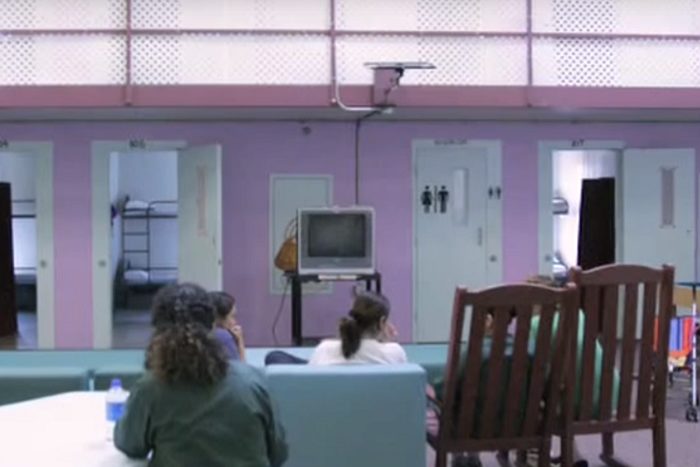At Hutto Detention Center, the Women on Strike ‘Want to Continue Resisting’
A detainee participating in the weeks-long hunger strike at the T. Don Hutto Residential Center in Taylor, Texas, confirmed women are being transferred to other detention centers as punishment for participating in the strike, according to audio released Wednesday by Grassroots Leadership.

A detainee participating in the weeks-long hunger strike at the T. Don Hutto Residential Center in Taylor, Texas, confirmed women are being transferred to other detention centers as punishment for participating in the strike, according to audio released Wednesday by Grassroots Leadership, an organization that forms part of a larger umbrella group known as Texans United for Families (TUFF).
The woman in the audio clip said detainees are being told the transfers are happening because new women are arriving and the beds are needed, “but it has to be because of the hunger strike … because there are women who’ve been here over a year.”
Holding asylum seekers for months—even years—is not an uncommon practice. The woman in the audio explained that she’s been at Hutto for months, despite being sentenced to just five days for “crossing the river.”
Transfers have been taking place since last week and Cristina Parker, the immigration programs director for Grassroots Leadership, said that when women are transferred to other detention facilities, it is with little notice.
“It’s a very serious problem because being transferred means they are moved away from their attorneys and from their community support. They’re already so far from their families, who don’t live in the U.S. or who are located in other parts of the country. These two things are all they have,” Parker said. “It’s a very intentional tactic on ICE [Immigration and Custom Enforcement]’s part because it also breaks the bonds these women have formed with each other in detention. With something like a hunger strike, the thinking is that breaking the original 27 hunger strikers up will make it stop.”
Advocates are concerned about where women are being transferred. Two women were moved to a detention center in Pearsall, near San Antonio, which has been at the center of sexual abuse allegations, according to Grassroots Leadership.
The Pearsall facility is operated by the private prison corporation GEO Group, which has a long history of abuse and negligence. The organization also reported that at least four women from Hutto were moved to the Laredo Processing Center, which is operated by Corrections Corporation of America (CCA). As Rewire reported last week, CCA is the nation’s oldest and largest for-profit private prison corporation and it has come under attack many times for human rights violations, including at Hutto, which was once used to detain immigrant families, including children.
The women in Hutto have no intention of stopping the hunger strike, Parker said, but they are changing their tactics. Women in Hutto announced to TUFF they would begin a rolling hunger strike that would move through the center section by section. In previous weeks at the height of the mass hunger strike, Grassroots Leadership estimates that at least 125 women were striking at Hutto. In this new approach, each section, which is comprised of between 40 to 50 women, will strike for several days and when they stop, it will be taken up by the next section. The women told TUFF they will continue the rolling hunger strike indefinitely.
Parker told Rewire there are two reasons the women are taking this new approach. The first, she said, is that it will have fewer consequences on their health. The second is that they hope it will make them less visible to ICE. Guards routinely threaten the hunger strikers with transfer, deportation, and criminal charges should anyone die because of the hunger strike, according to women inside Hutto.
“All of these threats are very terrifying to the women and the threat of transfer strikes a very real fear in them. All detention centers are horrible—they’re prisons—but the centers the women are being transferred to, like Pearsall, operate like high-security prisons and men are also detained there,” Parker said.
Parker told Rewire that there is an understanding by both the women and detention guards that Hutto is different than other detention centers to which they’re being transferred. In a call on Monday with a woman from Hutto who was transferred to Laredo, the woman reported to Parker that a guard told her that her “vacation is over.”
“ICE can deny the hunger strike is happening and that these transfers are coincidental, but what that guard said is acknowledgement that this is punishment and retaliation for participating in the hunger strike,” Parker said. “In the face of all of this, the women want to continue resisting.”
